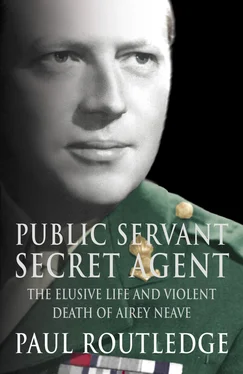En route to Lille that July the German lorry carrying the wounded broke down. This mishap seemed to offer a chance to escape. While the lorry was being repaired, Neave and other walking wounded survivors of Calais wandered around the streets of Bailleul, without guards. The local people offered them food and wine, and some offered to hide them from their captors. The French spirit of resistance was already showing itself within weeks of capitulation, but Neave did not avail himself of these offers. He admitted later that he lacked not just the physical strength but also the nerve to seize the opportunity. The weeks in hospital had sapped his will. ‘My vacillation cost me dear,’ he wrote, ‘but at this time there was no military training in such matters.’ 2 In the warm summer evening, French people threw flowers and bid them goodbye from the main square of Bailleul, and Neave felt ashamed at his inaction. Subsequently, he vindicated his hesitation. Had he got away so soon, he argued, he would not have escaped from Colditz and would not have been in a position to help others emulate his example. It was perhaps a questionable piece of rationalisation after the event, to square his conscience with this unheroic episode.
Once in the Lille hospital, his thoughts again turned to flight. This time he planned to escape with Captain John Surtees of the Rifle Brigade and a Corporal Dowling of the Durham Light Infantry. A young Frenchwoman who brought food and flowers to the wounded promised to help. Once out of the hospital, they would get civilian clothes, take the train to Paris and live incognito in a Left Bank pension. It did not seem dangerous, but it was not a very well thought-out escapade for the trio had no papers and practically no money. Senior officers later upbraided them for putting the other wounded men at risk of reprisals had they got away.
In August 1940, the prisoners of Lille hospital, or at any rate those judged to be walking wounded, were taken on a long march east to their destination in a POW camp. They trudged through Belgium ‘from one foul transit camp to another’ before arriving at the mouth of the River Scheldt. There, they embarked on a huge, open coal barge for a three-day journey up the Waal and the Rhine to Germany. Neave felt he was on a voyage of lost souls crossing into the unknown. Life was over. As they passed under the bridge at Nijmegen in Holland, a young woman waved at the prisoners; as she did so, the wind caught her clothing, lifting her skirt and with it the spirits of the men. Neave, although overcome with despair, could not but admire the insouciance of the average Tommy, who never gave in, never lost heart.
The officers were disembarked to take up residence in Oflag IXa at Spangenburg, near Kassel. Their place of incarceration was an imposing Schloss with a vaulted gateway, moat, drawbridge and a clock tower. Here the men could walk round the battlements and on a clear day take in the view of farmland and distant hills.
Spangenburg reminded Neave of school – a school to which their fathers might have been sent. In a sense he was correct, for indeed they had: the castle had been a POW camp in the first war. The new boys, like the previous generation, slept in two-tiered bunks with straw palliases and coarse blankets. It was August, one year into the war. Years of imprisonment stretched ahead of them, and initially Neave resigned himself to his fate. He filled in the time with composition and meditation, writing half a fantastic novel about the life after death of a Regency peer, a study of Shakespeare’s sonnets and an essay on eccentrics for the camp magazine. He soon discovered the limits to the literary taste and sense of humour of English officers. His articles were rejected as unsuitable. The days thus passed wearily, and when he came to write his accomplished account of his adventures he preferred to draw a veil over these early efforts.
There were few attempts to escape. On one occasion, the officers who got away were captured and beaten up by drunken German civilians. Surprisingly, escape was considered bad form by the senior British officers, who had successfully imposed a pre-war army system of discipline and class values inside the camp. They argued that escape for one or two men would invite reprisals on the hundreds left behind, and even threatened unsuccessful escapers with court martial, though they were not in a position to carry out the threat. Low morale and poor rations also contributed to the ‘anti-escape’ attitude.
However, in the autumn of 1940, Red Cross parcels began arriving, improving health and lifting spirits. Would-be fugitives could now hoard ‘iron rations’ to sustain them during any planned flight. Opportunities for escape also increased in December 1940 when Neave and others were moved to a new camp in the wooded village below the castle. They were closer to a Stalag, a camp for non-commissioned officers and rank and file, who went on working parties outside the wire where the prospects for escape were more frequent. Neave, by now bored by the deadening routine of reading, talking and waiting for Red Cross parcels, sought to transfer himself to the Stalag. Life in the new camp brought new frustrations. The prisoners were closer to society and woke every morning to the sounds of the farmyard. Such proximity sometimes made them feel part of normal life but at the same time reminded them they were not. Here, Neave passed the winter ‘in discomfort, but without great suffering, unless it were of the soul’. His stomach became accustomed to the meagre prison diet, and he was unable to eat a whole tinned steak and kidney pudding doled out to each prisoner on Christmas Day.
Before his plan to transfer to a Stalag could be implemented, however, Neave and his fellow POWs were suddenly transferred in February 1941 by train to Poland. Their destination was an ancient, moat-encircled Polish fortress on the River Vistula at Thorn (modern-day Torun), part of the huge encampment of Stalag XXa. (They later learned that they had been moved to this inhospitable spot as a reprisal for alleged ill-treatment of German prisoners in Canada.) At Thorn, officers were quartered in damp underground rooms, with little opportunity for exercise and none for escape. The fact that they were in Poland, a country about which they knew little, and hundreds of miles further east, made flight even more difficult. It was a soul-destroying existence, enlivened only by the daily rendition of ‘Abide With Me’ at sunset by a group of British orderlies on the drawbridge above the moat. Despite his imprisonment, Neave, who had been confirmed at St Ronan’s, did not lose his Christian faith, as some did. He later remarked that the singing of this hymn ‘was the only moment of hope and reality in all our dismal day’.
The main compound, for several hundred British NCOs and men, was three miles away. Neave quickly realised that this site was his best hope of escape. Several of the men from his own Searchlight Battery captured after the fall of Calais were in the hutted camp, and he communicated with them through working parties that came every day to the fortress. As required by camp discipline, Neave took his plan to the senior British officer, Brigadier the Hon. N.F. Somerset DSO, MC. He proposed to escape from the hut used by a captured British dentist to treat POWs. The ‘surgery’ consisted of a treatment room, waiting room and a lavatory behind it with a corrugated iron roof. Neave, with his co-escaper Flying Officer Norman Forbes, planned to slip away from the dentist’s hut, and then hide for a few days among the teeming throng of ‘other ranks’ inside the camp, before making a break from an outside working party. Neave’s fellow officers in his room mocked his plan, but it was approved by Brigadier Somerset. He was ‘paired’ with Forbes, an RAF Hurricane pilot who had been shot down over the French coast, because he spoke fluent German. It was an excellent match. Forbes, Neave decided, was of original mind, more practical than himself and a man of great determination.
Читать дальше












